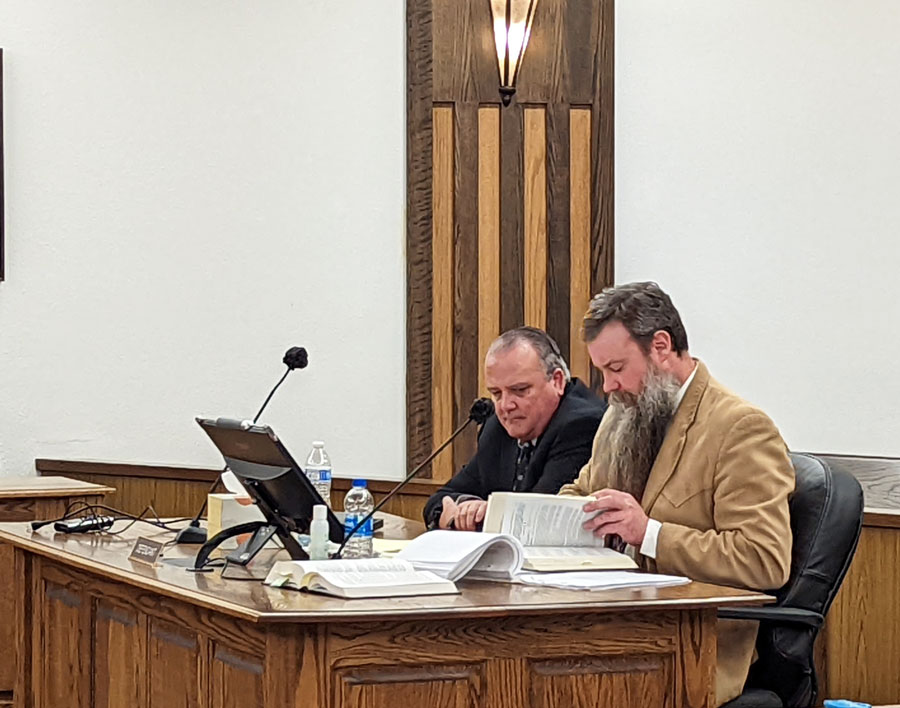Prosecutors seek to disqualify defense attorney in Sheriff Rowland case
Published at | Updated at
BLACKFOOT — In a motion filed Thursday, the Idaho Attorney General’s Office claimed there was a conflict of interest that should eliminate Justin Oleson as the defense attorney in the case against Bingham County Sheriff Craig Rowland.
Lead Deputy Attorney General Jeff Nye, acting as prosecutor in the case against Rowland, said in his motion that Oleson’s position as Custer County prosecuting attorney legally disqualifies him from serving as a defense attorney.
“The State recently learned that the Idaho State Bar has issued a formal opinion prohibiting a county prosecutor from representing a criminal defendant in a different county unless he has obtained the written consent of both the criminal defendant and the state,” Nye says in the motion.
In his motion, Nye included a formal ethics opinion from the Idaho State Bar, which itself cites the Idaho Rules of Professional Conduct.
The State Bar states in its opinion that conflicts arise when counsel has interests “adverse to his defense.” In this case, Nye says Oleson’s position as a county prosecutor presents such adverse interests.
“A prosecutor’s client in a criminal case is not the county where he serves or the victim in that particular case, but the state itself,” the Idaho Rules of Professional Conduct state.
The problem Oleson has with the motion is that it claims the state “recently learned” of the opinion by the Idaho State Bar. The opinion, he points out, was drafted in 1990.
“You guys are a little slow reading opinions if it’s taken you 30 years,” he told EastIdahoNews.com.
Oleson says he was aware of the opinion when he took the position as Custer County prosecutor in 2016. He said it was part of the agreement when he took office that he be allowed to continue his practice as a defense attorney.
And this isn’t the first time a prosecutor has filed this same motion, Oleson added. In fact, he says it has been argued at least six times previously — with each motion being denied.
“Every time prosecutors get scared, they try to get me kicked off the case because they know they’re going to lose,” he said. “Why would they be trying to kick me off unless they’re scared?”
In a memorandum supporting their motion, Nye also says that, according to the state bar’s opinion, an employee of the state cannot provide “conflict-free counsel,” a Sixth Amendment right.
“A county prosecuting attorney in Idaho cannot provide conflict-free assistance to a criminal defendant in Idaho,” the memorandum says. “The prosecuting attorney’s client is the state in every criminal’s case filed in his county and, consequently, he owes the state his undivided loyalty.”
As the opinion cited states, a prosecuting attorney can be allowed to serve as a defense attorney with consent from both the state and the defendant. And according to the motion, Oleson has not received that consent from the state.
As Oleson claims though, he has received consent from Custer County, and gets the same consent from every defendant he represents. The issue, he said, is that the Idaho Attorney General’s Office seems to believe it must grant its own consent.
“It doesn’t say who in the state needs to give consent,” Oleson said. “They seem to think that they are gods.”
Oleson is representing Rowland, who has been charged with felonies for aggravated battery and aggravated assault, as well as a misdemeanor for exhibition of a gun, following an incident near his Blackfoot home in November.
Those charges came after Rowland allegedly pointed a gun at a car filled primarily with children, then held the gun to the head of the lone adult.
According to police reports and evidence presented in hearings, a Latter-day Saint youth group, consisting of girls between the ages of 11 and 15 accompanied by one adult leader, were handing out thank you cards in their neighborhood. One of those cards was meant for Rowland’s wife, who teaches the girls in church.
Rowland is accused of stopping the car as it attempted to leave, pointing his semiautomatic handgun at the car, then yanking the driver’s hair while holding the gun to her head.
At a March 2 preliminary hearing, Fremont County Magistrate Judge Faren Eddins determined there was sufficient probable cause for a trial and bound Rowland over to district court.
He is scheduled to be arraigned in District Court by 6th District Judge Stephen Dunn on March 31.
Oleson expects this hearing to continue as scheduled.


